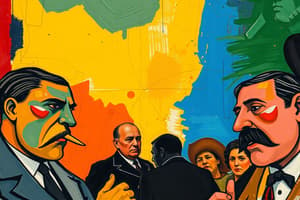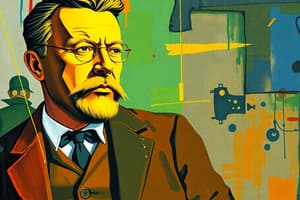Podcast
Questions and Answers
What was the main purpose of Alfred T. Mahan's arguments regarding sea power?
What was the main purpose of Alfred T. Mahan's arguments regarding sea power?
- To promote economic isolationism for the United States
- To advocate for the acquisition of overseas territories for defensive bases (correct)
- To emphasize the importance of land military forces over naval power
- To justify U.S. military intervention in Latin America
Which amendment stated that the U.S. had no intentions of annexing Cuba after the Spanish-American War?
Which amendment stated that the U.S. had no intentions of annexing Cuba after the Spanish-American War?
- Platt Amendment
- Roosevelt Corollary
- Teller Amendment (correct)
- Jones Act
What was the main consequence of the Platt Amendment for Cuba?
What was the main consequence of the Platt Amendment for Cuba?
- Cuban military forces were disbanded by the U.S.
- Cuba was granted full sovereignty over its own affairs.
- The U.S. maintained the right to intervene in Cuban affairs. (correct)
- Cuba could independently negotiate treaties with other nations.
What event led to the overthrow of Queen Lil in Hawaii?
What event led to the overthrow of Queen Lil in Hawaii?
Who commanded the Rough Riders, the cavalry unit that Teddy Roosevelt was a part of?
Who commanded the Rough Riders, the cavalry unit that Teddy Roosevelt was a part of?
What was one outcome of the Foraker Act in Puerto Rico?
What was one outcome of the Foraker Act in Puerto Rico?
What did the Roosevelt Corollary add to the Monroe Doctrine?
What did the Roosevelt Corollary add to the Monroe Doctrine?
What role did Valeriano Weyler play during the Cuban struggle for independence?
What role did Valeriano Weyler play during the Cuban struggle for independence?
What was a significant outcome of the deLome Letter written by Dupuy de Lome?
What was a significant outcome of the deLome Letter written by Dupuy de Lome?
Which of the following best describes 'Yellow Journalism'?
Which of the following best describes 'Yellow Journalism'?
What was a key principle of the Open Door Policy regarding China?
What was a key principle of the Open Door Policy regarding China?
What was the immediate trigger for the Spanish-American War?
What was the immediate trigger for the Spanish-American War?
Which of the following best describes the role of the Rough Riders during the conflict at San Juan Hill?
Which of the following best describes the role of the Rough Riders during the conflict at San Juan Hill?
How did the Treaty of Paris (1898) affect Spain's territorial claims?
How did the Treaty of Paris (1898) affect Spain's territorial claims?
What issue arose with American settlers in Hawaii during the expansion period?
What issue arose with American settlers in Hawaii during the expansion period?
Which event is associated with the call to 'Remember the Maine'?
Which event is associated with the call to 'Remember the Maine'?
Flashcards are hidden until you start studying
Study Notes
Teddy Roosevelt and Military Expansion
- Served as Assistant Secretary of the Navy, strengthening the Pacific squadron under Admiral George Dewey.
- Gained fame as a key figure at the Battle of San Juan Hill with the Rough Riders.
- Advocated for the philosophy "Speak softly and carry a big stick," emphasizing a strong military presence.
Influential Figures and Their Theories
- Alfred T. Mahan, a U.S. naval officer, argued that great nations need sea power; authored "The Influence of Sea Power Upon History."
- Suggested the U.S. should acquire defensive bases in the Pacific and Caribbean for strategic advantage.
- Admiral George Dewey led the U.S. Navy to significant victories and was a mentor to Roosevelt.
- General Arthur MacArthur was tasked with capturing Emilio Aguinaldo to quell the Philippine rebellion.
Cuban and Philippine Conflicts
- General Valeriano Weyler led Spanish troops that placed Cuban citizens into concentration camps.
- Emilio Aguinaldo played a crucial role as a leader of the Filipino Rebellion against colonial rule.
Hawaiian Nationalism
- Queen Lil sought to restore power to Native Hawaiians under the slogan "Hawaii for Hawaiians," but her reign was ended by a U.S.-backed rebellion in 1893.
- King Kamehameha I welcomed American settlers, leading to the arrival of missionaries and subsequent societal changes.
U.S. Foreign Policy Shifts
- William McKinley’s election in 1896 marked a shift from Grover Cleveland's neutral stance towards intervention in Cuba.
- The Rough Riders, a cavalry unit led by Leonard Wood and prominently featuring Roosevelt, gained acclaim during the Spanish-American War.
Legislative Measures
- The Platt Amendment (1901) restricted Cuba's ability to negotiate treaties and granted the U.S. the right to intervene in Cuban affairs.
- The Teller Amendment (1898) assured that the U.S. had no intentions to annex Cuba while maintaining military presence until 1902 for stabilization.
- The Foraker Act established a colonial government in Puerto Rico, with a bicameral legislature featuring both U.S. appointees and elected Puerto Ricans.
- The Jones Act (1917) granted Puerto Ricans U.S. citizenship.
Doctrines and Ideologies
- The Monroe Doctrine warned European powers against interference in the Western Hemisphere’s affairs, establishing spheres of influence.
- The Roosevelt Corollary expanded the Monroe Doctrine, allowing U.S. intervention in Latin America for maintaining order.
Public Sentiment and Media Influence
- The de Lôme Letter criticized President McKinley and stoked pro-war sentiment leading to the Spanish-American War.
- Yellow journalism, led by figures like William Randolph Hearst and Joseph Pulitzer, used sensationalism to rally public support for military action.
Key Events and Conflicts
- The Treaty of Paris (1898) ended the Spanish-American War, recognizing Cuban independence and ceding Puerto Rico and Guam to the U.S.
- Pearl Harbor was established as a U.S. naval base in 1887, crucial for refueling and resupplying naval forces.
- The explosion of the USS Maine served as a catalyst for war with Spain, fueling public outrage with the rallying cry "Remember the Maine!"
- The Boxer Rebellion in China was an uprising against foreign influence, with the U.S. involved in suppressing the rebellion.
Expansion Targets and Their Impacts
- Hawaii became a strategic port on the route to Asia, leading to cultural and economic upheaval due to American settlement and influence.
- As American commercial interests grew in Hawaii, traditional practices and governance of Native Hawaiians were significantly altered.
- The development of a canal across Central America was a major interest for both the U.S. and England.
Studying That Suits You
Use AI to generate personalized quizzes and flashcards to suit your learning preferences.




